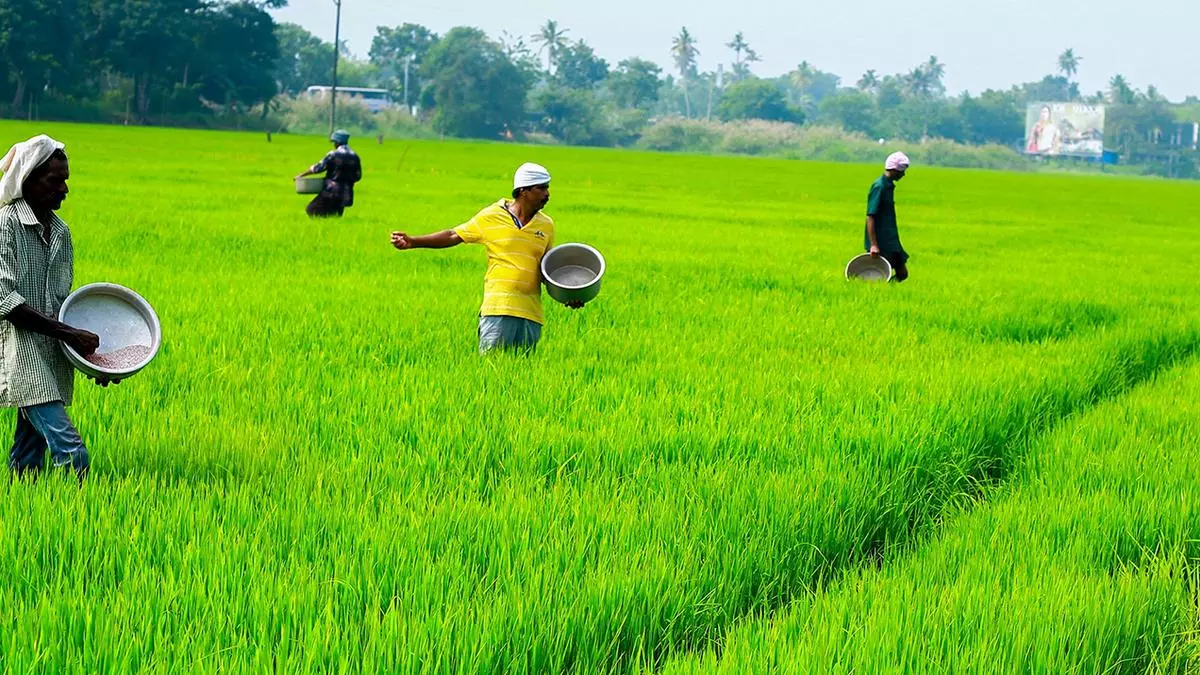The agriculture and commodities sectors view the Budget as providing the much-needed impetus to farmers’ welfare, rural economy, women’s development, technological advancement and crop productivity.
However, some of them say the Budget should have looked at allocating more for schemes such as the National Oilseeds Mission, reducing the burden of GST and encouraging import-substitution.
Deepak Ballani, Director-General of the Indian Sugar and Bio-Energy Manufacturer Association(ISMA), said the association lauds significant measures which were introduced for the agricultural sector in the 2025 Budget. Welcoming the Dhan Dhanya Krishi Yojana, he said it is expected to liberate farmers and ensure fair benefits to all participants in the agricultural sector.
Key concerns not addressed
Sanjeev Asthana, President, Solvent Extractors Association, said the association welcomed the government’s move to focus on the food processing industry and artificial intelligence for the agriculture sector and setting up an additional Gene bank for enhancing plant productivity. He also urged the Centre allocate an additional ₹5,000 crore for the Oilseed Development Programme.
Suhas Buddhe, Adviser, Soluble Fertilizer Industry Association(SFIA), said the budget’s focus on millet production, sustainable farming, and technological advancements, such as drone integration, aligns well with India’s long-term agricultural vision.
However, it fully does not address key industry concerns, particularly in the area of import substitution for advanced agricultural inputs. He said the sector felt let down by the lack of provisions for establishing farm schools to educate and train marginal farmers in modern agricultural techniques.
Hike in KCC limit
Gaurav Kedia, Chairman, Indian Biogas Association, said the success of the Dhan Dhanya Krishi Yojana depends on enhanced sustainable agricultural with organic farming taking centrestage. Strengthening on FPO and cooperatives by setting up central boards with help of States was the key.
KV Karthik, President, Indian Pump Manufacturers Association, said the increase of Kisan Credit by ₹2 lakh will directly spur demand for agricultural pumps, benefiting farmers and the industry alike. “Additionally, the extension of the Jal Jeevan Mission to 2028 will create sustained business opportunities, ensuring a continued push for water accessibility across the nation,” he said.
Jitendra Kumar, MD, Biotechnology Industry Research Assistance Council (BIRAC), said the Budget’s focus on crop diversification, post-harvest storage and credit accessibility for 1.7 crore farmers aligns with BIRAC’s commitment to supporting agri-biotech innovations.
Balram Singh Yadav, Managing Director, Godrej Agrovet Limited, said empowering farmers, sustainable production and resilient agri-economy were imperative for “Viksit Bharat”.
India’s position as the second-largest global producer of fish and aquaculture will further be bolstered by the reduction in basic customs duty on a key input material for feed, strengthening competitiveness and sustainability in the sector, he said.
Vegetable clusters a boost
Rajavelu NK, CEO-Crop Protection Business, Godrej Agrovet Limited & Co-Chairman of the FICCI Committee on Crop Protection Chemicals, said “The Mission for Cotton Productivity, integrating science and technology with extra-long staple cotton varieties, addresses declining cotton acreage while helping farmers boost yields and profits.”
Simon Wiebusch, Country Divisional Head, Crop Science Division of Bayer in India, Bangladesh and Sri Lanka, said the Budget outlines a comprehensive strategy for enhancing agricultural productivity and sustainability, aligning with the vision of Viksit Bharat. The emphasis on improving post-harvest storage, irrigation and credit availability is expected to empower farmers and push economic growth in rural areas.
Additionally, the establishment of large-scale clusters for vegetable production and the support for FPOs and start-ups in promoting vegetable supply chains will help to not only promote rural prosperity, boost horticulture sector but also meet the nutrition needs of the country, he said.
Susheel Kumar, Country Head and Managing Director, Syngenta India Pvt Ltd, said the Union Budget reaffirms the government’s intention and commitment to revitalising rural India and addressing the urban-rural divide. By focusing on infrastructure, innovation, and self-sufficiency, the Budget presents a transformational roadmap for India’s rural economy.
Susheel Kumar, Country Head and Managing Director, Syngenta India Pvt Ltd
‘Nothing for agro-chemicals’
Sanjiv Kanwar, Managing Director, Yara South Asia, said the focus on innovation, investment, and sustainability in agriculture is a bold move that will undoubtedly lead to a thriving and self-reliant agricultural future for India.
The strategic focus on crop diversification, improved irrigation, and better credit availability is essential for the sustainable growth of our agriculture sector. “Furthermore, the comprehensive programme for fruits and vegetables, aimed at promoting production, supplies, processing, and better remunerative prices, is a forward-thinking move that will benefit both farmers and consumers, while taking the country towards a better nutritional future,” he said.
KC Ravi, Chief Sustainability Officer, Syngenta India, said the Budget is a well-structured set of opportunities for Indian agriculture, laying out a practical, holistic, forward-looking, and revitalising roadmap that strengthens farmers, improves productivity, and drives self-sufficiency.
KC Ravi, Chief Sustainability Officer, Syngenta India
However, it did not have anything for the agrochemical industry which plays a critical role in protecting crops from pests and diseases. It was looking forward to some long-standing demands in GST rationalisation, enhancing of weighted deduction to 200 per cent and extending Production Linked Incentive (PLI) scheme to the sector, he said.
Focus on climate-change
Ravi Annavarapu, President, FMC India, said the budget has a progressive, growth-focused vision to transform the Indian agriculture sector. Integrating 6 crore farmers into a digital registry via enhanced digital public infrastructure will improve transparency, democratise access to digital agricultural services, and pave the way for precision agriculture, he said.
Ravi Annavarapu, President, FMC India
Ajay S Shriram, Chairman and Senior Managing Director, DCM Shriram Ltd, said the Budget on the agriculture front, the focus has been on climate-change, rural employment, self-sufficiency, irrigation, and modernisation. Policies such as establishment of gene bank are helpful in shortening the research cycle for development of climate-resilient seeds.
Tarun Sawhney, Vice Chairman and Managing Director, Triveni Engineering & Industries Ltd, said the Budget has laid the foundation for a more inclusive and sustainable future by strengthening India’s agricultural ecosystem and accelerating the nation’s clean energy transition.

Tarun Sawhney, Vice Chairman and Managing Director, Triveni Engineering & Industries Ltd,
| Photo Credit: prashant kr singh
Water conservation and responsible wastewater management remain crucial for the country, and the extension of the Jal Jeevan Mission till 2028, aiming to achieve 100 per cent coverage of potable tap water connections across rural households is a welcome move, he said.
Anil Kumar SG, Founder & MD, Samunnati, said, the Budget reaffirms that agriculture remains a cornerstone of India’s growth vision, which is indeed a welcome development. By adopting new technologies and sustainable practices, Indian agri sector moves closer to securing nation’s food future while strengthening rural economies, he said.
Makhana Board initiative
Ayush Gupta, Business Head, India, at KRBL Limited, said, “The introduction of the developing agri districts programme, alongside initiatives for crop diversification, irrigation, and enhanced credit access, will directly benefit 1.7 crore farmers, strengthening India’s agricultural backbone.”
Anshul Garg, Director & CEO of Aroma AAT Basmati Rice, said the PM Dhan Dhanya Krishi Yojana in partnership with States will be a significant boost in Basmati production domestically. The enhanced credit line extended to 7.7 crore farmers for short-term loans of ₹5 lakh is also a significant announcement, helping them with financial viability during cultivation season, he said.
Rajesh Aggarwal, Managing Director, Insecticides (India) Ltd, said raising the loan limit under the modified interest subvention scheme will help more farmers invest in better resources and manage expenses efficiently.
“The establishment of a Makhana Board in Bihar will create opportunities for farmers by promoting value addition. The introduction of a Cotton Productivity Mission will further support those dependent on cotton cultivation,” he said.
Flavour for fragrance
Manoj Arora, Managing Director & Chief Perfumer, Sacheerome, said the Budget will directly benefit the fragrance and flavour (F&F) sector. The introduction of advanced farming techniques, modern equipment, and sustainable practices will ensure a steady supply of high-quality raw materials for our industry.
Saroj Kumar Mahapatra, Executive Director, PRADAN, said crop diversification and sustainable farming practices at the panchayat and block levels is the need of the hour which will ensure localised impact.
Sat Kumar Tomer, Founder & CEO, Satyukt Analytics, welcomed the announcement of the National Geospatial Mission, terming it revolutionary, as real-time spatial data can transform precision farming by optimising water and input in a small area under agriculture.

Sat Kumar Tomer, Founder & CEO, Satyukt Analytics
As we move toward our climate-resilient future, satellite-based analytics embedded with government schemes will be like magic for farmers as they gain insights to work on sustainable and profitable agriculture, he said.
Renuka Diwan, Co-founder and CEO, BioPrime, said the establishment of large-scale clusters for vegetable production near major consumption centres will streamline supply chains and ensure fresher produce for consumers.
Vimal Kumar Alawadhi, Managing Director, Best Agrolife Ltd, said, the targeted development of seeds (including commercial availability of 100-plus seed varieties) with pest resistance, high yield and climate resilience will enhance overall productivity.
Focus on 4 ‘I’s
Anand Ramanathan, partner, consumer products and retail sector leader, Deloitte India, said the announcements on agriculture as the first growth engine have been comprehensive in scope and will lead to enhanced agricultural productivity and rural livelihoods.
“Import substitution has received a fillip with the scheme on government procurement support for pulses and augmentation of capacity for domestic urea manufacturing. Exports have also received a boost with the announcements on marine processing, makhana cultivation and the cotton mission, “ he said.
Pushan Sharma, Director- Research, Crisil Intelligence on Agriculture, said the focus is on four ‘I’s — income, inflation, import reduction and insulation from climate change. This assumes importance as changing weather patterns have contributed to food inflation, which averaged 8.4 per cent during April-December 2024 versus 2.7 per cent for non-food inflation.
Shashi Kant Singh, Partner – Agriculture and Food, PwC India, said continued support towards empowering cooperatives and farmer producer organisations (FPOs) as well as focused initiatives for fisheries reinforces the Government’s commitment towards inclusive and sustainable growth for the agriculture sector.
Strengthening supply chain
Padmanand V, Partner and Agriculture Industry Leader, Grant Thornton Bharat, said competitive import substitution in pulses and oilseeds to phased MSP support for 4 years and thrust on fisheries were game-changing proposals.
Vivek Iyer, Partner, Grant Thornton Bharat, said agricultural reforms aim to strengthen supply chains, promote balanced nutrition, and enhance food security, indirectly curbing long-term food inflation.
Aashish Kasad, National Leader – Chemicals and Agriculture sector, EY India, said, “The Budget has underscored agriculture as one of the power engines, unveiling a series of policies and financial plans for the sector, aimed at reaching the objective of Viksit Bharat.”
Vimal Kumar Alawadhi, Managing Director, Best Agrolife Ltd, said the Budget initiatives will speed up agricultural productivity and growth, increasing prosperity in rural regions. The availability of both short-term and long-term credit will be a big boost for rural regions.
Sanjay Shirodkar, Co-Founder, Wavar, said by prioritising sustainability, the budget lays the foundation for long-term agricultural growth, ensuring better productivity and profitability for farmers.
Timely for fisheries
Amit Vatsyayan, Leader -Agriculture, Livelihood, Social and Skills, EY India, said, a structured policy framework for sustainable fisheries is both timely and essential. Investing in last-mile delivery technology and upskilling the workforce in digital and logistics management will be key to unlocking its full potential and driving inclusive growth.
Tarun Ahuja, Founder & CEO, And Fungi, said the Budget’s emphasis on crop diversification and enhanced agricultural support were welcome. The Budget is a game-changer for the health-conscious food industry.
Anand V S, Managing Director at NOCIL Limited, said the emphasis on infrastructure development, with an allocation exceeding ₹11 lakh crore, will significantly enhance supply chain resilience and the growth of direct and indirect sectors.

Anand V S, Managing Director at NOCIL Limited
SK Chaudhary, Chairman, Safex Chemicals, said the government has tabled a visionary document capturing the roadmap to pivot India’s role as an economic global superpower. “We applaud the bold and strategic reforms that draw the global attention to India’s coming of age in critical areas of food, critical resources, and energy security,” he said.
‘Stronger Make in India’
RG Agarwal, Chairman Emeritus, Dhanuka Agritech Limited, said the budget is a significant step towards a stronger, Make in India agriculture sector to boost the spirit of farmers. “While many positive initiatives have been put before us, we urge the government to revisit and make it 5 per cent GST on essential agricultural inputs,” he said.
Abhishek Jain, Director, Green Economy and Impact Innovations, Council on Energy, Environment and Water (CEEW), said the government should not only look at the kilograms of output but also the micronutrient profile of agricultural production. “Chasing quantity, our produce is increasingly becoming deprived of important micronutrients, contributing to a rampant issue of micronutrient deficiency,” he said.
Utham Gowda, Founder and Group CEO, Captain Fresh, said the declining trend in Indian marine products value since 2021-22 underscores the dire need to prioritise value-driven exports along with volume-driven growth.
Utham Gowda, Founder and Group CEO, Captain Fresh
Tackling rural migration
Ankur Aggarwal, Chairman – CropLife India and Managing Director of Crystal Crop Protection Ltd., said the government’s well-defined vision to prevent migration from rural areas, coupled with the scheme that prioritises women and youth, is a welcome and forward-thinking step.
Saket Chirania, Co-Founder of Agrizy, said the slew of measures introduced by the government, from reforms envisage in the Budget will ensure the ease of doing business and help unlock fresh opportunities for expansion, innovation, and global competitiveness.
Mayur Modi, Co-Founder, MoneyBoxx, said encouraging farm revenue seems to be the mandate from the Budget. The Budget spurs agriculture in both directly and indirectly.
Madan Mohan, President, The International Federation of Indigenous Zebu Cattle Of India (IFIZCI), said the increased loan limit under the Modified Interest Subvention Scheme from ₹3 lakh to ₹5 lakh is a welcome move for farmers engaged in agriculture and allied activities. This will provide much-needed financial support to small and marginal farmers, enabling them to access credit at a lower interest rate.
Price focus on yield
Amit Patjoshi, CEO, Palladium India, said the Finance Minister’s strong emphasis on agriculture in the Budget is a transformative step toward making India the food basket of the world.
Rohit Mehrotra, Co-founder of Organic Tattva, said an 8 per cent increase in subsidies for food, fertilizer, cooking gas and infrastructure development aims at boosting agricultural productivity and supporting farmer’s financial well-being.
Ankur Aggarwal, Managing Director, Crystal Crop Protection Limited and Chairman, CropLife India and Managing Director of Crystal Crop Protection Ltd, said, the precise focus on enhancing productivity in the Budget is expected to foster significant growth in the agricultural sector, benefiting farmers and promoting sustainable farming practices. The government’s well-defined vision to prevent migration from rural areas, coupled with the scheme that prioritizes women and youth, is a welcome and forward-thinking step.
Haresh Karamchandani, MD & Group CEO, HyFun Foods, said the government is continuing to push farm exports to a new level, with a strategic goal of reaching $80 billion by 2030. This is also in line with India’s aspiration to be a global food powerhouse. Improved cold chain infrastructure and streamlined export logistics will empower Indian food brands to expand their global footprint.
Opportunity for dairy
Ranjith Mukundan, CEO & Co-founder Stellapps Technologies, said the government’s focus on revitalising the rural economy through skilling, technology, and investment is a strong step toward unlocking India’s agricultural potential. For the dairy sector, this presents an opportunity to enhance productivity, quality, and global competitiveness.
Anubhav Agarwal, MD and CEO, BN Group, said the government’s commitment to boosting oilseed production through the National Mission for Edible Oilseeds is a crucial step toward reducing import dependency and strengthening India’s edible oil ecosystem. For the edible oil sector, this push underscores the need for innovation, investment, and strategic expansion to reduce import dependence and enhance domestic production.
Ajay Kakra, Leader, Food and Agriculture, GIDAS, Forvis Mazars in India, said the Budget takes a transformative approach to agriculture by focusing on grassroots implementation and farmer empowerment.
Meghna Mishra, Senior Partner at Karanjawala & Co, said recognising the need for sustainable farming, a significant budgetary allocation has been made for irrigation, agricultural infrastructure, and modern farming techniques.
Drone skilling
Pradeep Palelli, Co-Founder & CEO of Thanos Technologies, said his company was elated to hear about the allocation of funds towards developing 100 agri districts in Phase 1 and skilling initiatives for rural youth, women, and landless families. This substantial investment will catalyse the adoption of advanced agri-tech solutions, including precision farming and AI-driven analytics.
Chirag Sharma, CEO, Drone Destination, said the government’s commitment to boosting agriculture, MSMEs, and women’s empowerment aligns perfectly with the vision for drone technology to create real impact in sectors like agriculture and skill development.
Aiding circular economy
Sachin Jain, Regional CEO, India, World Gold Council, said the Budget proposals are advantageous for the gold industry as they increase disposable incomes, encourage spending, and promote economic growth across various income levels.
Praveena Rai, MD & CEO, MCX, said the announcement made on removal of basic customs duty on waste and scrap of metal commodities like copper, lead, zinc and others has the potential to boost the circular economy, enhance raw material supplies and support domestic manufacturing.
Renisha Chainani, Research Head, Augmont, said the import duties the Budget included a new tariff line to clearly distinguish imports of gold in bar form from those in other forms, considering the disruption of the market created by imports of platinum alloy. Additionally, the 25 per cent customs tariffs on gold jewellery items have been lowered.
MP Ahammed, Chairman, Malabar Group, said the Budget has rightly focussed on offering fiscal impulse to boost consumption. “For the retail and jewellery sector, a rise in consumption directly translates into stronger demand, fuelling expansion and employment generation,’‘ he said.
